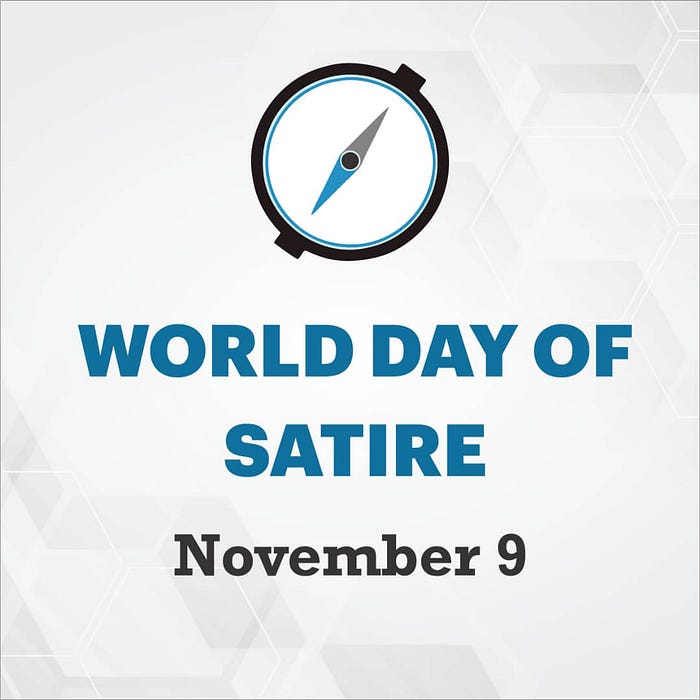Why we declared November 9 World Satire Day

“If there is something you’d like to see but doesn’t already exist, create it.”
This was the maxim that pushed me to start Punocracy in March 2018. I yearned for an online platform that allows people, Nigerians, to express themselves and comment on socio-political issues using satire. None existed already and, since I wanted it so badly, I made it my responsibility to midwife it into reality.
Before then, I’d read and fallen in love with the works of George Orwell, Pius Adesanmi, and Andy Borowitz, and felt this was a style of writing that needed to be promoted more widely and passionately.
The objectives of Punocracy mainly included triggering interest in politics, encouraging new styles of socio-political commentary, and simply having fun. And in the many months, since the blog saw its first ray of sunlight, we have received lots of positive feedback. One of our followers texted us once to say he feels the platform has just created an opportunity for him to fully maximize his writing talents.
It was also the “create it” maxim that pushed the Punocracy team (of columnists), during a meeting of May 1 2019, to plan towards declaring a World Day of Satire. We had Googled and discovered, to our surprise, that there wasn’t already a day dedicated to the celebration of this unique art.

I have heard a lot of young people say they don’t give a shit about politics and hardly even listen to the news. And I believe satire has a remarkable way of making people interested in a topic they originally cared less about. A number of things I know about United States politics today is thanks to watching humorous analyses and commentary from The Daily Show hosted by Trevor Noah. I believe satire can have that effect on a lot more people if we give it a chance. Not only does it trigger your interest and fascination about a topic, it also forces you to question your preconceived notions.
Our mission is simple: to have more satirical literates across the country and the globe. And this does not only mean having people who can actually write great satire (like the top entrants for our prize for satire writing competition)… But more importantly, having people who can read and appreciate satire for what it truly is: an attempt to correct ills in the society using ridicule, irony, humour, and wit.
I wonder why there isn’t already an International Day for Satires, especially in an era when there’s a day for almost anything. We have the World Sword Swallowers Day, World Emoji Day, Stick Out Your Tongue Day, Kiss and Make Up Day, Be Late for Something Day, and World Lindy Hop Day. Don’t even know what that last one is. In Nigeria, there’s also the tradition of naming someone’s birthday an international day of some sort.
So why not a World Satire Day?
Satirical literacy is important.
Satires, odd and unconventional as they may seem, often do a better job in mirroring the society than other forms of writing. If well written and publicised, satire holds power accountable in ways you could never have imagined.
Listen to what these men have to say:
Satire is one of the most powerful weapons of speech in a free society. It stirs the collective consciousness against oppressive governments and laws, rulers, the rich and powerful (look at Voltaire and the rich tradition of political cartoons in the modern world, all the way to the biting social commentary of freedom of speech warriors like Lenny Bruce and George Carlin), and moreover points a mirror at we ourselves as individuals: exposing the hypocrisies and frailties of our individual positions on issues — hopefully getting us to see where others are coming from in how they view the world. Thus, satire also takes tremendous steps to opening up dialogue on the issues where it had otherwise been stifled — penetrating that wall through a universal language of humor: if we are only willing to give a little introspection and laugh at ourselves.
WESS HAUBRICH, “In defense of Truly Free Speech: ‘South Park’ at 21”, The 405, September 17, 2017
A man is angry at a libel because it is false, but at a satire because it is true.
G. K. CHESTERTON, Five Types: A Book of Essays
A single satire will sometimes effect more good than a hundred sermons.
PIETRO ARETIN, attributed, Day’s Collacon
I have to admit that one event that has continued to fuel these events and our work at Punocracy is the illustrious life and sad death of Pius Adesanmi, (one of) Nigeria’s greatest satirist(s), in March this year. It all seemed like yesterday. His book, Naija No Dey Carry Last, is my introduction to made-in-Nigeria satire and my thirst hasn’t waned since reading it. A day such as this allows us a constant opportunity to celebrate that part of the great man, as well as others like Elnathan John and Olatunji Dare and Jonathan Swift and George Carlin.
Why did we pick November 9?
We could easily tell you that according to history books, November 9, 1989, was when East Germany denounced the Berlin Wall after which German citizens tore it down, and how we want the day to fit into this narrative of freedom and absence of censorship. Or we could tell you that November 9 (11/9) is actually an inversion of 9/11 and tie this to how there are always alternative, civilised ways of venting grievances, rather than through violence … But the truth is it is just a convenient date for us.
And one thing I’ve come to realise is we don’t need permission from history to make history.
We thus have the pleasure of declaring the 9th of November World Satire Day and look forward to celebrating it with the world many years to come. We hope you’ll join us in 2020.
